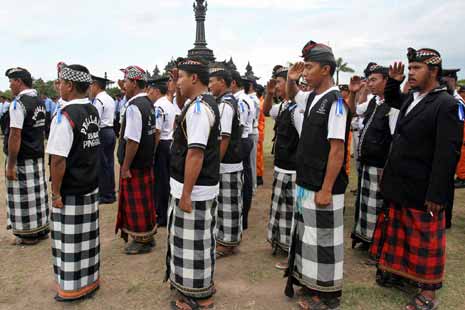
The main council of municipal organizations (MUDP) of Bali island has announced that they have formulated and documented the key principles for the traditional guards, pecalang (brave individuals in black-and-white checkered sarongs), in order to prevent their misuse and abuse of authority.
These measures were taken after it was revealed that many pecalang often exceed their rights or perform tasks they shouldn't. Traditionally, the duties of pecalang included only monitoring order and silence during Nyepi celebrations. Later on, they started assisting in organizing ceremonies and maintaining law and order in villages.
The principles for pecalang, formulated last year, will soon be released in the form of paper books and distributed among village and settlement administrations.
Today, it is often observed that they work as security guards in bars, discos, or nightclubs. This should not be the case. Very often, establishment security personnel simply use the pecalang uniform.
The word "pecalang" originates from the Sanskrit word "akala," meaning firmness, harmony, and strength. In Balinese tradition, all law enforcement and protective functions must be based on three aspects: the relationship between humans and gods (parahyangan), human-to-human interactions (pawongan), and human interaction with the environment (palemahan). All three of these aspects should embody the belief that physical and spiritual well-being is achieved through balanced existence. Thus, pecalang assist the police in maintaining harmony among people.
Legally, the functions of pecalang involve guarding villages during religious ceremonies, traditions, and customs. They are appointed to their positions and relieved from them by the village leadership.
The guiding principles of the Council also describe the hierarchical structure of pecalang. For instance, the directive outlines that the organization consists of Manggala (leaders of governance), including kelihan (chief), penyarikan (secretary), petengen (treasurer), and kasinoman (press secretary). The number of organization members is determined locally by the village leadership.
Furthermore, the Guidelines also clarify that the authority of pecalang has limitations. For example, when organizing a cremation ceremony, pecalang must coordinate their actions with the police and obtain the appropriate permission to close certain roads. It is also within the duty of pecalang to protect and assist residents and visitors in maintaining law and order. If a thief is caught, pecalang must help hand them over to the police.

You can add one right now!